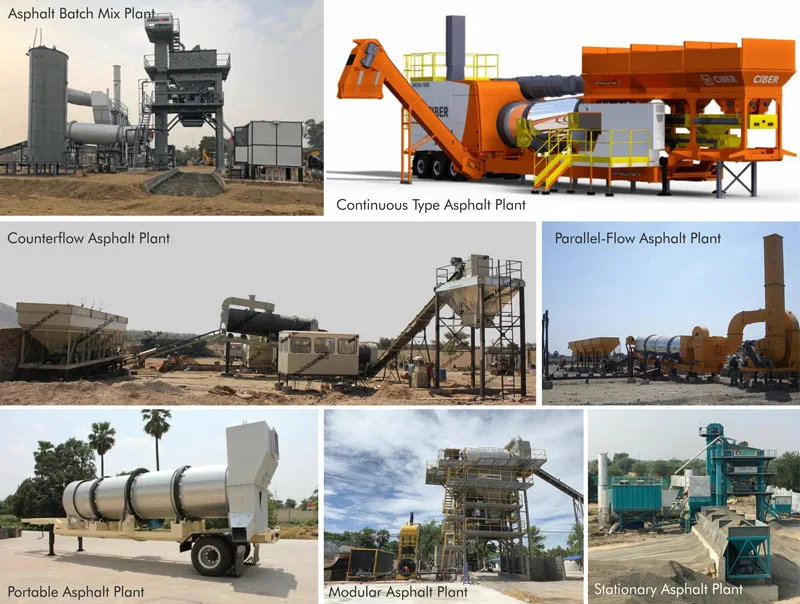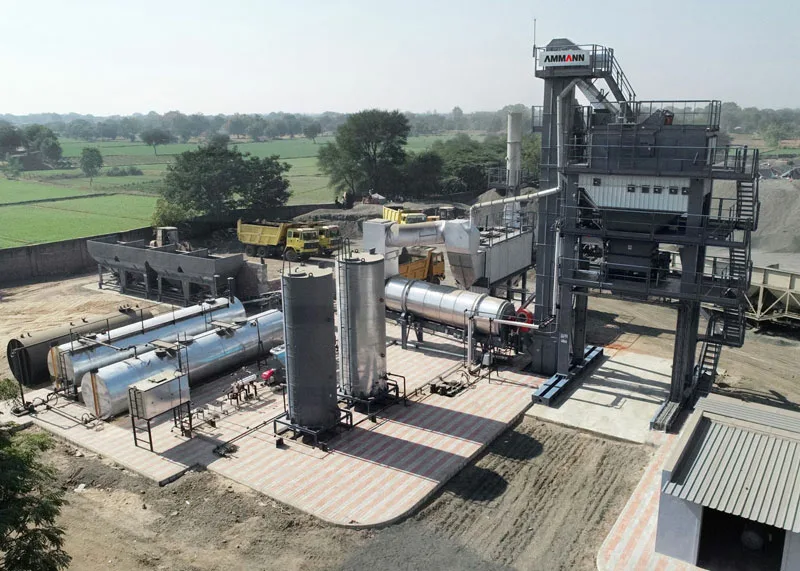An asphalt batch mix plant is a specialised plant used to manufacture hot mix asphalt (HMA), which is a mixture of asphalt binder and aggregates (stone, sand, and gravel) at high temperatures. The process involves heating and drying the aggregates in a rotating drum and then mixing them with precise proportions of asphalt binder in the mixer. The resulting hot mix asphalt is then transported to the construction site and laid down to form roads, highways, airport runways, parking lots, and other paved surfaces. The plant allows for precise control over the quality and composition of the asphalt mix, ensuring that it meets the required specifications and standards. As each batch is produced separately, adjustments can be made in real-time to ensure the asphalt mix meets the required specifications.
Components of asphalt batch mix plants
- Cold Aggregate Feeder Bins: These bins store and supply various sizes of aggregates (stone, sand, etc.) in predetermined proportions to the drying drum.
- Drying Drum: The drying drum is where the aggregates are heated and dried before they are mixed with asphalt binder.
- Burner: The burner is responsible for heating the aggregates in the drying drum using fuel like diesel, natural gas, or heavy oil.
- Bitumen Storage Tanks: These tanks store the asphalt binder (bitumen) at the required temperature until it is ready to be mixed with the aggregates.
- Weighing System: The weighing system accurately measures the quantities of aggregates and bitumen to ensure the correct mix proportions.
- Mixer: The mixer thoroughly blends the heated aggregates and asphalt binder to produce hot mix asphalt.
- Control Panel: The control panel is the central unit that allows operators to monitor and control various operations of the plant, such as temperature, mixing time, and batching.
- Dust Collection System: To control emissions and dust generated during the process, asphalt batch mix plants are equipped with dust collection systems, such as baghouse filters.
- Filler Silos: Filler materials like lime, fly ash, or cement are often used to improve the properties of asphalt. Filler silos store and supply these materials when needed.
- Hot Storage Silo: The hot storage silo holds the hot mix asphalt after it is produced, waiting to be loaded into trucks for transportation.
- Recycle Unit (optional): In some plants, a separate unit is included to handle recycled asphalt pavement (RAP) and incorporate it into the mix.
- Exhaust Stack: The exhaust stack releases combustion gases and hot air from the drying drum after passing through the dust collection system.
Advantages of asphalt batch mix plants
- Better temperature control during the mixing process, ensuring optimal heating of aggregates and bitumen, leading to improved asphalt quality.
- Can handle a variety of aggregates, including coarse and fine materials, efficiently blending them to achieve the desired mix gradation.
- Minimises material segregation, resulting in a more uniform and homogeneous mix, which is crucial for achieving durable asphalt pavements.
- Utilises an effective burner with easy-to-adjust mechanism to set air/fuel ratios for proper combustion and pollution control.
- Utilises precise weighing systems for aggregates, bitumen, and additives, ensuring accurate proportioning of materials for consistent mix quality.
- Offer better moisture control during the mixing process, preventing the introduction of excess moisture, which could negatively affect asphalt performance.
- Many batch plants are designed for ease of transportation and installation, making them suitable for temporary or remote projects.
- Can minimise the risk of asphalt oxidation by reducing exposure to air during the production process, preserving the asphalt’s long-term performance.
- Allow for easy customization of mix designs, enabling the production of precise asphalt blends tailored to specific project requirements and climatic conditions.
- Can efficiently handle different Job Mix Formulas(JMFs), making them ideal for projects with varying mix designs and specifications.
- Many batch plants are designed to incorporate a significant proportion of Reclaimed Asphalt Pavement (RAP) into the mix, promoting sustainability and reducing the demand for new materials.
- Can be equipped with multiple hot storage silos, offering greater flexibility in managing different mixes and storing materials on-site.
- Operators have more control over each batch’s production parameters, leading to optimized material usage and reduced wastage.
Types of asphalt batch mix plants
Batch Type Asphalt Plant:
A batch type asphalt plant consists of several major components, including cold aggregate feeder bins, a rotary drying drum, a batch tower, an asphalt mixer, and storage silos. In this type of plant, aggregates are stored in cold aggregate feeder bins and then transported to the rotary drying drum. The aggregates are heated and dried by hot gases generated by the burner in the drum. After drying, the aggregates are mixed with hot asphalt binder in the batch tower. This plant offers precise control over the mix design, making it suitable for producing a wide range of asphalt mixes. Additionally, it is easier to maintain and provides flexibility in production quantities.
Continuous Type Asphalt Plant:
A continuous asphalt plant consists of a continuous flow drying drum, a burner, and a continuous mixer. In this type of plant, aggregates are continuously fed into the drying drum and mixed with hot air and burner fuel for drying. The dried aggregates are then mixed with hot asphalt binder in the continuous mixer. The final Hot Mix Asphalt (HMA) is continuously discharged from the other end of the drum. These plants are known for their high production rates and are ideal for large-scale projects requiring a constant supply of asphalt.
Parallel-Flow Asphalt Plant:
In a parallel-flow asphalt plant, the flow of aggregates and hot gases moves in the same direction through the drying drum. These plants offer better heat transfer and more efficient drying of aggregates, resulting in higher quality HMA. They are suitable for projects that demand high-quality asphalt mixes.
Counterflow Asphalt Plant:
In a counterflow asphalt plant, the flow of aggregates and hot gases moves in opposite directions through the drying drum. These plants achieve better heat transfer efficiency, allowing for the production of high-quality HMA, especially when incorporating high RAP content. They also help to reduce emissions and energy consumption.
Portable Asphalt Plant:
Portable asphalt plants are designed for easy transportation between different construction sites. They offer flexibility and cost-effectiveness for projects that require frequent relocation. Portable plants are typically compact and come pre-wired and pre-plumbed for quick setup.

Stationary Asphalt Plant:
Stationary asphalt batch mix plants are installed in a single location for long-term use. These plants are well-suited for continuous production and are often chosen for high-capacity projects or where a stable supply of HMA is required in a specific area.
Modular Asphalt Plant:
Modular asphalt plants consist of multiple modules or sections that can be quickly assembled or disassembled. The modular design allows for easy transportation, setup, and customization based on project requirements. It also simplifies maintenance and expansion of the plant.
Batch Mix Plant with RAP Addition:
A batch mix plant with RAP addition is designed to incorporate Reclaimed Asphalt Pavement (RAP) into the asphalt mix. The inclusion of RAP in the mix allows for the reuse of existing asphalt, reducing the need for new aggregates and preserving valuable natural resources. This types of batch mix plant consists of Cold Aggregate Feeder Bins, Rotary Drying Drum, Batch Tower, Asphalt Mixer and Storage Silos: The plant comes with multiple coupled geared motors eliminating the need for a linkage mechanism, thereby limiting parts and maintenance costs. Wear parts are durable and easy to maintain and replace. Central lubrication points simplify mixer maintenance. The distribution deck protects mesh and dispenses material to avoid screen overload and damage. The plant is also easy to pack and load. Fast setup times mean a quick return to production upon arrival.
Batch Mix Plant with Warm Mix Asphalt (WMA) Technology:
A batch mix plant with Warm Mix Asphalt (WMA) technology produces asphalt at lower temperatures compared to traditional Hot Mix Asphalt (HMA) plants. WMA technology allows for the production of asphalt mix at reduced temperatures, resulting in several advantages. The components of a batch mix plant with WMA technology are similar to a standard batch plant, but the mixing process involves specialized additives or technologies that allow the mix to be workable at lower temperatures.
Each type of asphalt batch mix plant offers unique advantages, and the choice of plant depends on factors such as project size, location, mobility requirements, environmental considerations, and mix specifications. Evaluating these factors will help in selecting the most suitable type of asphalt batch mix plant for a particular project.
Applications of Components of asphalt batch mix plants
- Road Construction (Highways, Expressways, Local Streets)
- Road Rehabilitation and Maintenance
- Airport Runways and Taxiways
- Parking Lots
- Industrial Sites
- Rural Roads
- Recreational Areas (Sports Fields, Playgrounds, Bike Paths)
- Bridges and Overpasses
- Specialized Projects (Racetracks, Speed Bumps, High-Friction Surfaces)
Conclusion
The versatile nature of asphalt batch mix plants allows them to produce different types of asphalt mixtures tailored to specific project requirements, contributing to the durability and longevity of road surfaces. Furthermore, with the Indian government’s focus on infrastructure development and initiatives like “Bharatmala” and “Sagarmala,” the demand for asphalt batch mix plants is expected to remain robust as India continues to invest in its transportation and connectivity networks.
Image Source: ammann.com, wirtgen-group.com, atlasindustries.in, capious.com, speedcrafts.com, lintec-linnhoff.com/in/, alltech-group.com





